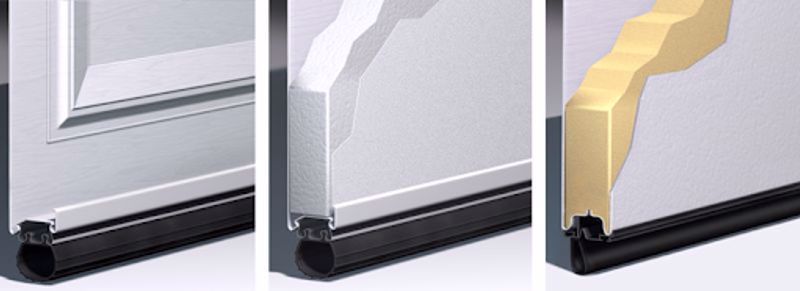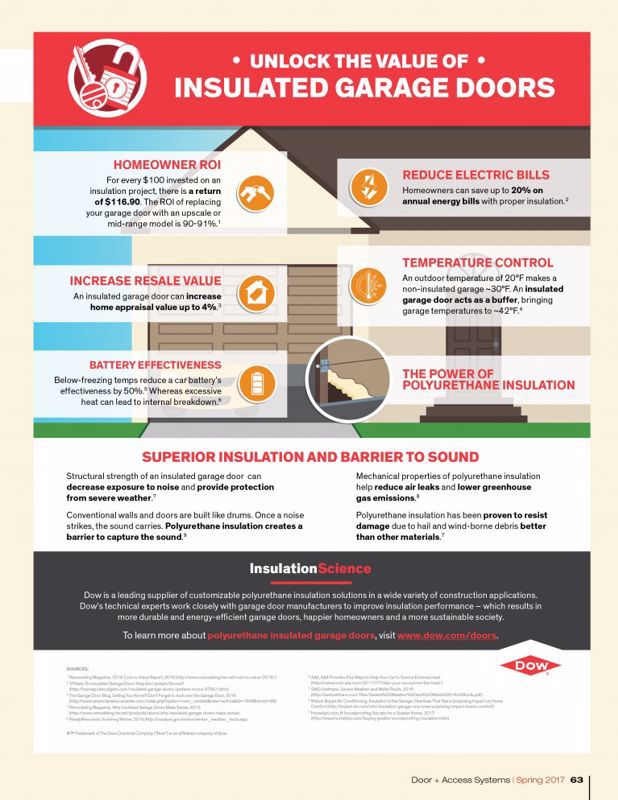Insulated Garage Doors: The Sensible Solution for 5 Common Garage Problems
- Mar 13, 2024
- Seasonal Tips
- 7 minute read

When you think of weather-proofing your home, does your garage come to mind? Whether you use your garage for parking or to accommodate other hobbies and activities, you should feel as comfortable in your garage as you do sitting in your living room.
Garage door insulation should be top of mind as you consider which garage door to buy. Let’s take a look at why garage door insulation is important, different types of insulation and how a well-insulated door can solve five common garage problems.
Why Garage Door Insulation is Important
You’ve heard of insulation, but do you know the full scope of what it does for your home? Because many people use the garage for more than storing cars, it should be cared for like the rest of your home.
Whether you use your garage as a storage space or a place for your creativity to thrive, here are some surprising reasons you should consider adding insulated garage doors.
1. Improve Energy Efficiency
If you have an attached garage that is not properly insulated, air can travel into or escape from the living space. In the summer when your AC is working overtime, and in the winter when the furnace is cranked, insulated garage doors can reduce heat transfer and heat loss to conserve energy.
2. Improve Airflow
With an insulated garage door, you can better control your home’s airflow as insulation helps regulate temperature. Your garage is typically the largest door opening in your home; without insulation, it’s like leaving the front door wide open while the air conditioning unit is running.
3. Lower Noise Levels
Insulation’s greatest secret is that, in addition to regulating temperature, it also effectively regulates sound. When your garage door is sealed properly with high-quality insulation, not only does your garage door make less noise when operating, but it helps cut down on outside noise as well.
So, if you have neighbors with loud dogs or live on a busy street, you can make your home’s atmosphere a little more tranquil.
Understanding Garage Door Insulation Types
Garage door insulation is available in a few types, each with its own price point and benefits depending on your budget and needs. If you’re shopping around for particular insulation levels, you’ll need to consider the R-value. This measurement is how insulation professionals determine thermal resistance. The higher the value, the more resistant, which makes it a more insulative material.
There are three basic types of garage door insulation: fiberglass, polystyrene and polyurethane.

Garage doors are available with no insulation (left), polystyrene insulation with vinyl backing (center), or polyurethane insulation with steel backing (right).
Fiberglass Insulation
You’ve probably seen fiberglass insulation in new-build home projects; the pink cotton candy-like material. It’s made of very fine glass that is melted and spun or blown into fibers.
Fiberglass is a good thermal insulator, an effective sound-dampener and is fire-resistant, making it an affordable option for garage door insulation. However, this is type of insulation is typically available through DIY in home kits which is not the best solution when shopping for insulated garage doors.
The best choice is to choose garage doors that are already insulated properly from the manufacturer and contain polystyrene or polyurethane insulation.
Polystyrene Insulation
Polystyrene insulation, commonly called styrofoam, is a closed-cell foam board that is waterproof, fireproof and protects against weather changes. This type of insulation is one of two that Amarr offers on garage doors, the other being polyurethane.
It’s a colorless thermoplastic option that contains small pockets of air making this material the most effective insulation. This type of insulation is also one of the most durable options, typically lasting 30 to 50 years before a replacement is necessary. Finally, rigid foam paneling is non-toxic, chemically inert and non-irritating.
Polyurethane Insulation
Polyurethane (PUR), or polyisocyanurate (PIR), is a type of insulation material that offers good thermal efficiency and strength.
It’s a spray-on material that foams up to create its insulative barrier, which makes it resistant to mold, water damage and fire. PUR can also fill small gaps within the garage door, making it a great solution for garage doors.
Most Amarr garage doors are available with one of these two types of insulation: polystyrene and polyurethane. Either material will improve temperature regulation and prevent heat loss.
Should I Add Insulation or Get a New Insulated Garage Door?
Technically you can add insulation to already installed garage doors; however, we do not recommend it as it will not be as durable or have the same quality as doors properly manufactured with insulation.
Choosing a pre-insulated option direct from the manufacturer is your best bet. Although non-insulated doors are cheaper, the year-round usability of your garage overtime will benefit from an insulated door. The value lies in how you utilize your garage — do you have any items of value that could get damaged under high heat or low temperatures? Do you work or play in your garage? Would you like to dampen noise from the outside of your house while in the garage? If the answer to any of these is yes, opt for insulated garage doors.
How Insulation Solves 5 Common Garage Problems
Wondering whether or not you need to insulate your garage doors? Let’s take a look at five common garage door problems you might be experiencing to find out.
Problem 1: My Garage Is Too Cold!
In areas that experience extremely cold temperatures, an insulated garage door is a must. If you find that your garage stays cold in the winter, consider upgrading to an insulated garage door. Without insulation, your garage cannot seal in heat effectively.
Problem 2: My Garage Is Too Hot!
On the other side of temperature regulation, you may be finding your garage is too hot. An insulated garage door helps your garage stay cooler by more effectively sealing in cooler air.
Problem 3: My Energy Bills Are Too High!
If you find yourself paying more than you ought to on your energy bills but are using the furnace and AC responsibly, it could be that your uninsulated garage door isn’t probably regulating temperatures.
As a result of good heat stability, garages act as a buffer and help maintain temperature to keep energy costs down.
Problem 4: The Garage Door Is Too Noisy!
The insulation in your garage door dampens the clattering sound that non-insulated steel garage doors often make. In turn, this makes insulated doors significantly quieter and provides much-needed relief for many homeowners with loud garage doors.
Problem 5: I Have To Replace the Door Because of Damage!
Insulated garage doors are considerably more rigid than their non-insulated doors, thus helping them endure minor impacts, such as rebounded basketballs or small fender-benders.
So, if you’re wondering whether it’s best to repair or replace in this case, we’d encourage a full replacement.
Want to learn more benefits of insulated garage doors? Check out this infographic from our polyurethane manufacturer, Dow, courtesy of Door + Access Systems Magazine!

Trust Amarr When Considering an Insulated Garage Door
When it comes to protecting your home from extreme weather, cutting down on energy costs and preparing for longevity, we’ve got you covered. With Amarr manufacturing insulated garage doors and professional garage dealers installing them, you are in good hands. With us, you’ll never have to wonder if you’re getting the right deal or the perfect garage door.
Talk to a garage door dealer at a location nearest you.

